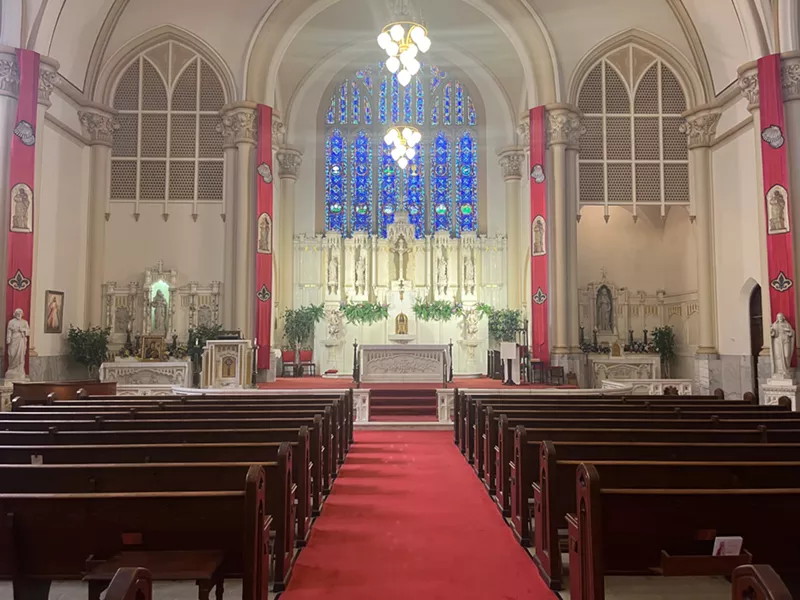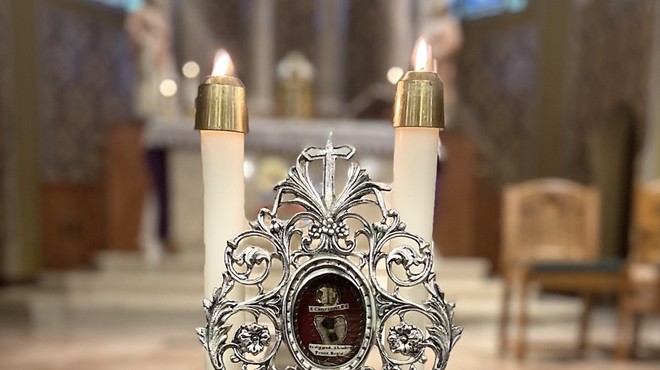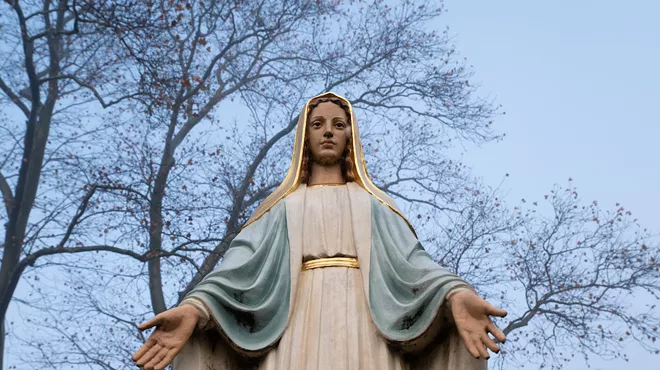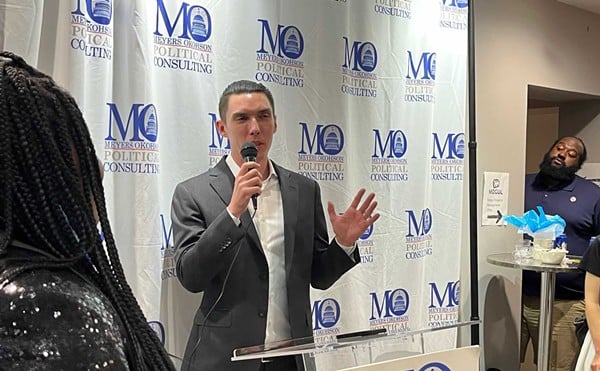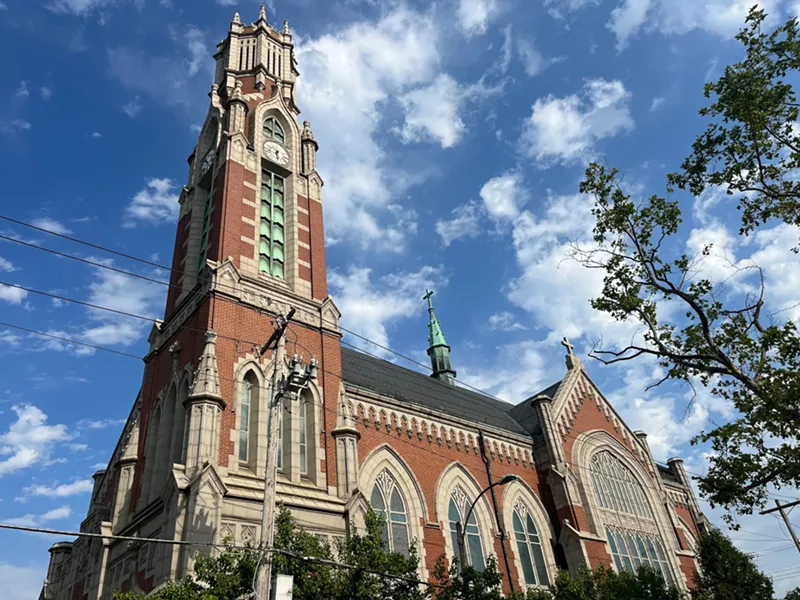
For Bill Hannegan, one of St. Roch’s parishioners, this is the most emotional part of the church, where he has socialized with friends and family after mass for nearly six decades. Hannegan’s relationship to the church, like many other St. Roch parishioners, spans through generations of family — his grandmother was an original member, and the church was the site of his parents’ wedding.
“There’s something about that physical place,” Hannegan says. “It’s really, really special. The exterior of the church is one of the prettiest in St. Louis.”
Now, St. Roch is one of 34 St. Louis parishes scheduled for closure on August 1 — leaving many members wondering why.
On May 24, St. Louis Archbishop Mitchell Rozanski signed a decree stating that St. Roch (6052 Waterman Boulevard) was to be subsumed, or absorbed, into Christ the King Church (7324 Balson Avenue) more than a 45-minute walk away. The technicalities of the closure, including what it means for the St. Roch Grade School, are unclear.
The amalgamation came as a part of the All Things New plan launched by the Archdiocese of St. Louis in January 2022, recognized as the most sweeping reorganization of the Catholic church in St. Louis history. The archdiocese has said that its goals are to enhance evangelization processes and confront a lack of pastors, with parish reorganizations, including church closures and mergers, as well as 155 priest reassignments.
In an announcement to press on May 27, Rozanski maintained that the plan affects the entirety of the region, despite nearly half of the closures occurring in north St. Louis and north St. Louis County.
These closures follow a national trend of declining religious populations in the U.S. in the last three years, one often attributed to the ongoing sexual abuse scandals, a generational separation from Christian morals and the COVID-19 pandemic.
On May 31, Ward 10 Alderwoman Shameem Clark-Hubbard and Executive Director of the Skinker DeBaliviere Community Council Mike Reid wrote to Rozanski requesting he revoke the decree closing St. Roch Parish. The letters highlight the role of the church in community engagement and stability, pointing to the more than 100-year history of St. Roch as a cornerstone to the area. St. Roch draws individuals from over 30 ZIP codes, many from the city. Of St. Roch students, 45 percent are not Catholic; 50 percent of people in the parish boundaries are people of color.
Reid wrote he was troubled that a majority of closures and consolidations occurred in north St. Louis city and county, where the average household income is $45,543 per year.
“The Skinker DeBaliviere Community Council is extremely concerned that the decision to close St. Roch was based on biased information,” Reid’s letter states. “One should not have to have a car in the city to celebrate one’s faith.”
Mike Stephens, president of the St. Roch Parish Council, assisted in writing the appeals, which were accompanied by letters of support from Washington University in St. Louis, St. Louis Mayor Tishaura Jones and Antionette Cousins, president of the City Board of Education.
“We don’t think St. Roch was evaluated in a fair manner and consistent with the ideals of the Catholic Church,” Stephens says. “It wasn’t given credit for evangelization and for our role in the community and as a strong, standing pillar of the city.”
Most closures occurred in areas that the archdiocese deemed underserved and where evangelization should most occur, according to Stephens.
“To whom are they evangelizing to? The west county parishes they already have?” Stephens asks.
The archdiocese says that the All Things New planning committee used hundreds of parish feedback summaries, interviews, surveys, listening sessions and financial data to develop adecree for each parish. St. Roch’s Community Council had been in communication with the archdiocese for about two years prior to the decree and had been under the impression St. Roch would remain mostly unchanged.
“It’s unclear to everyone why there was a sudden reversal and the parishes who were going to be in the pastorate were closed, or subsumed or amalgamated,” Stephens says. “No one knows why, after almost two years of talking, this plan was dropped. I think we deserve an answer.”
The archbishop cites low attendance and financial debt as reasons for St. Roch’s closure, stating that the parish has operated “at a financial deficit in each of the past five years, with an aggregate deficit in excess of $1 million for those years.”
This information is blatantly incorrect, Stephens says, and St. Roch is financially healthy and independent. According to Hannegan, the archdiocese did not speak to the president of St. Roch’s Finance Committee before drawing these conclusions. As for the low attendance, both point to the pandemic and the delivery of remote masses by the church. St. Roch also had to cut down to one mass a weekend because the parish’s monsignor of 40 years, the legendary Salvatore Polizzi, became sick, passing away in April at age 92.
“The archdiocese didn’t give him any help in that regard, and now they’re holding it against us in terms of how many people showed up at mass,” Stephens says.
Many parishes affected by the decrees are frustrated by the lack of transparency and clear communication by the archdiocese, with many individuals undertaking their own initiatives to protect church accessibility to the public. One such individual is Jason Bolte, who founded Save Rome of the West when All Things New was first made public, with the mission to uphold and maintain sacralized spaces. Now, his organization has international reach as it confronts larger issues of power consolidation within the church, problems he ascribes to the lack of accountability following the sexual abuse crises and what he sees as the shift away from God following the Second Vatican Council.
Bolte’s own parish, St. Barnabas the Apostle in O’Fallon, is being subsumed by parishes about 30 miles away. While he himself will continue to worship, many within his parish are elderly or disabled, leaving them unable to make the journey. Many have given up on their faith as a result, Bolte says.
The archdiocese is not addressing these inequities, and did not truly listen to any concerns that parishes had prior to the decrees being released, Bolte says.
“The whole thing has been so frustrating to deal with because we’ve tried to have the conversations because they say they want dialogue,” Bolte says. “Every time I’ve met the archbishop, he’s been very dismissive and walked away from me.”
When asked about Bolte’s allegations, Lisa Shea, the director of community and media engagement of the Archdiocese of St. Louis, wrote that the decisions took into consideration feedback from tens of thousands of Catholics from every parish and school in the Archdiocese of St. Louis.
“Parishioners have many feelings about their parishes, each unique to the person and their experiences,” Shea wrote.
Ken Battis, a local lawyer and insurance claims professional, founded an organization with other members of the St. Louis Church Militant group calling for transparency from the archdiocese in regards to the All Things New Plan. Save Our St. Louis Parishes has garnered about 3,500 signatures in support — the largest number of Catholics to have signed mandates to oppose a merger in the history of the American Catholic Church, Battis says.
Battis recalls an email correspondence with the Catholic Leadership Institute, the for-profit consulting group from outside of St. Louis that pitched the All Things New Plan to the St. Louis archdiocese, where he asked for evidence of the “measurable data” that megamerger plans would increase mass attendance. While the institute did not respond, they did remove the phrasing from their website.
“While they’re getting your money to do information and changes about your diocese, and their own board members are telling them to respond, they refuse to respond,” Battis says. “That’s just indefensible.”
Some organizations tell a different story. With about 3,200 volunteers and 140 parish-based chapters, the Society of St. Vincent de Paul is a local, Catholic non-profit organization that provides person-to-person assistance to those in need, according to Executive Director John Foppe, who also served on the Social Outreach and Catholic Presence committee of the archdiocese during the All Things New planning process. While the organization will lose 33 of its chapters with the rollout of All Things New, Foppe is hopeful that volunteers will continue their service in the new parish configurations. To do this, merging chapters are meeting to become better familiarized with one another, while their mission to serve those in need remains steady, he says.
“[Our members] understand that changes are necessary,” Foppe says. “While sometimes painful, I think that for the most part our members are really trying to view this positively.”
Battis says that a head leader of St. Vincent de Paul reached out to him last week asking how many parishes were under appeal because they had not heard back from the archdiocese.
“I replied nicely but sort of straightforwardly saying, ‘Where have you been? I agree with you, they won’t reply to us either,’” Battis says. “‘Why do you or [other Catholic non-profit organizations] let [the archdiocese] call us unfaithful Catholics and kick us off church grounds, when this is the very kind of question we should ask?’”
When asked whether he felt the archdiocese had communicated clearly and transparently with St. Vincent de Paul, Foppe said yes.
Chris Martin, the archdiocesan vicar for parish mission and vitality, spoke to members of St. Vincent de Paul to prepare them for the change, and the organization hopes to meet with Rozanski to discuss responses, Froppe says.
Neither Chris Martin, the archdiocesan vicar for parish mission and vitality, nor Rozanski were present at a single open session for parishioners, according to Battis. Instead, attendees were provided a pre-recorded video and a facilitator who wrote questions to pass on to the archdiocese.
Rozanski’s All Things New Plan is not new to St. Louis, or to the archbishop himself — he closed several churches in Springfield, Massachusetts in 2016 and 2017 for the consolidation of financial and ministerial resources. Parish downsizing in other cities include strategic plans seen in Pittsburgh's “On Mission for the Church Alive” and Cincinnati’s “Beacons of Light.”
Battis draws a parallel between the secrecy by the archdiocese in All Things New and the secrecy by the church during the sexual abuse crises. Both are an abuse of power, Battis says.
“You could make an argument that God doesn’t care whether we have 100 more parishes or less parishes if we’re still serving the communities and saving souls,” Battis says. “But how will we know we’re doing that if there’s so much distrust and you won’t even meet with us or talk with us?”
Less than six months after being appointed by Pope Francis in 2020, Rozanski faced a civil lawsuit in Springfield alleging that he was part of “abhorrent attempts” to protect a bishop accused of sexual abuse by an altar boy. On June 27, Richard Stika, the Knoxville, Tennessee, bishop accused of silencing the rape of a diocesan employee, said he planned to relocate his ministerial activities to St. Louis following his resignation, where he was first ordained as priest in 1985, Crux reported.
"This morning we learned that Bishop Stika has made the decision to retire from the Diocese of Knoxville and return to St. Louis,” Rozanski said in a statement on June 27. “I am familiar with the allegations against Bishop Stika, and I believe he is making the correct decision for himself, the Church and the Diocese."
Battis points to Rozanski as an example of why the public does not trust bishops, as well as a part of the larger issue of distrust that exists towards the church.
“Why would people trust you if you’re using the same tactics against the faithful flock that you used against victims and whistleblowers when they tried to tell the truth?” Battis says.
Bolte believes the All Things New is a nefarious plan looking to maximize profit and detract from God.
“[The All Things New plan] was all pre-ordained as to what the outcome was going to be — and they’ll deny that until they’re blue in the face — but anybody with half a sense about them sees right through it,” Bolte says.
The archdiocese are treating the churches like Starbucks, he says, when they are not getting enough customers they close their doors.
“It’s not about that,” Bolte says, “It’s not about how many we’re serving. We have to serve anybody and everybody that we can.”
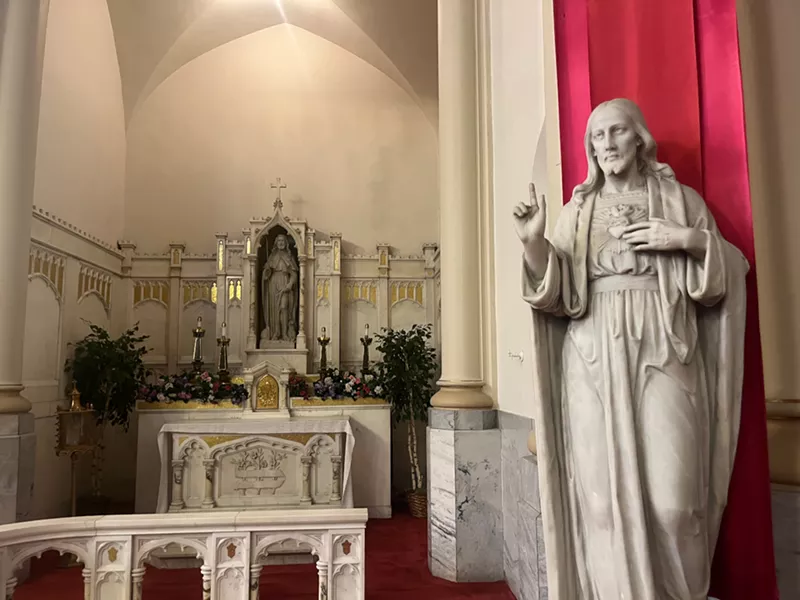
Others, however, feel sympathetic to Rozanski. Hannegan thinks that he may have faced pressure from consultants at the Catholic Leadership Institute.
“I think it’s partly just unfair to bring a guy in and say, ‘Here, do this major surgery on a city you’ve never been in before,’” Hannegan says.
In an interview with KMOX last week, when asked how he plans to restore any peace that was disturbed in the All Things New planning process, Rozanski asked those appealing to look past their individual church to the big picture of the archdiocese in the greater St. Louis community.
“To me, it’s very heartening to see that people are so attached to their parishes, but as we look at the demographics and to changes that have taken place, there is very, very much evidence that change has to be done in order to serve all of our people,” Rozanski said.
On June 29, Rozanski released a statement addressing the letters of appeal. He received almost 800 letters from 44 parishes with feedback, the letter states.
“I, along with the employees of the Metropolitan Tribunal, have read and considered every letter I’ve received, and I am responding to every one of them,” he writes.
Asked if parishioners would get the opportunity to meet directly with the archdiocese, Shea said in an email, “There have been many opportunities over the past two years for all parishioners to share their concerns regarding All Things New as it relates to their parish. The Archbishop has taken all of the concerns into consideration. In addition, there have been opportunities for pastors and their key parish leaders to validate or dispute the data collected from the parishes themselves.”
So far, the only communication received by St. Roch’s leaders has been a letter from the archbishop asking for donations.
“It just shows how insensitive they are,” Stephens says.
Yesterday, several St. Roch parishioners received rejections of their appeals and plan to take them to higher authorities.
Parishioners who disagree with any decisions have 15 business days to respond with a letter that will be sent to the Dicastery for the Clergy in Rome, Italy.
“I don’t want it to go to a court in Rome,” Hannegan says. “I want it to be decided here in St. Louis, and have [Rozanski] or his staff sit down with us and say ‘Where are we in disagreement here? Is there something we can show you that would change your mind?’”
This story has been updated.
Subscribe to Riverfront Times newsletters. Follow us: Apple News | Google News | NewsBreak | Reddit | Instagram | Facebook | Twitter | Or sign up for our RSS Feed

